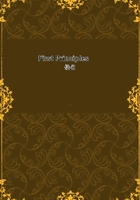
第43章
OF multitudinous criticisms made on the preceding five chapters sincethe publication of First Principles in 1862, it is practicable to noticeonly those of chief importance. Even to do this would be impracticable wereit not that most of them are essentially the same and may be met by the sameanswers.
Several opponents have contended that it is illegitimate to assert ofthe Ultimate Reality lying behind Appearance, that it is unknown and unknowable.
The statement that it is unknowable is said to assume knowledge greater thanwe can have: alike as putting an arbitrary limit to possible human facultyand as asserting something concerning that of which we are said to know nothing: a contradiction.
To the first of these objections, that an arbitrary limit is put to possiblehuman faculty an answer has already been given in §24, where it hasbeen shown that knowledge involves the three elements, Relation, Difference,Likeness; and that unconditioned existence, of which no one of these canbe affirmed without contradiction, consequently does not present a subject-matterfor knowledge. Further, in the next section it was pointed out that in theprocess of knowing there is the same implication. Thinking being relationing,no thought can express more than relations. From which truth it is inferablethat human faculty must become fundamentally unlike what it is, and knowledgemust become something other than what we call knowledge, before anythingcan be known about the Unconditioned.
The second objection is not thus easily met. It is doubtless true thatsaying what a thing is not, is, in some measure, saying what it is; sinceif, of all possible assertions respecting it, one is cancelled, the cancelling,by diminishing the number of possible assertions, implies an incipient definition.
A series of statements of what it is not, excluding one possibility afteranother, becomes eventually a line of exclusions drawn round it -- a definitionof it. The game of Twenty Questions illustrates this. Hence it cannot bedenied that to affirm of the Ultimate Reality that it is unknowable is, ina remote way, to assert some knowledge of it, and therefore involves a contradiction.
This extreme case, however, does but serve to bring out the truth that,limited as our intelligence is to the relative, and obliged as we are touse words which have been moulded to it, we cannot say anything concerningthe non-relative without carrying into our propositions meanings connotedby those words -- meanings foreign to a subject-matter which transcends relations.
Intellect being framed simply by and for converse with phenomena, involvesus in nonsense when we try to use it for anything beyond phenomena. Thisinability of the thinking faculty in presence of the Unconditioned, is shownnot only by the self-contradictory nature of its product, but also by thearrest of its process before completion. In attempting to pass the limitit breaks down before it has finished its first step. For since every thoughtexpresses a relation -- since thinking is relationing -- thinking ceaseswhen one of the two terms of a relation remains blank. As the relation isincomplete there is no thought properly so called: thought fails. So thatwe cannot rightly conceive even a connexion between noumenon and phenomenon.
We are unable in any consistent way to assert a Reality standing in somerelation to the Apparent. Such a relation is not truly imaginable.